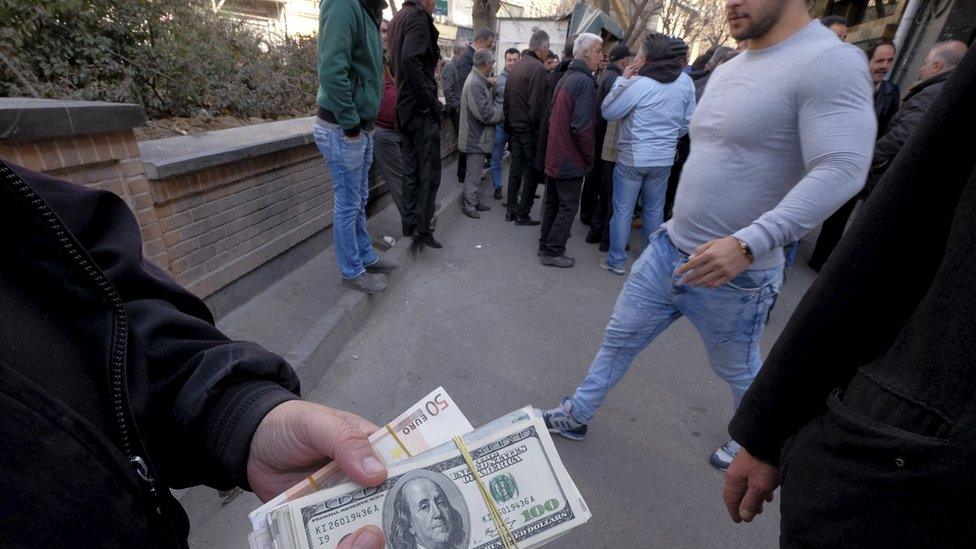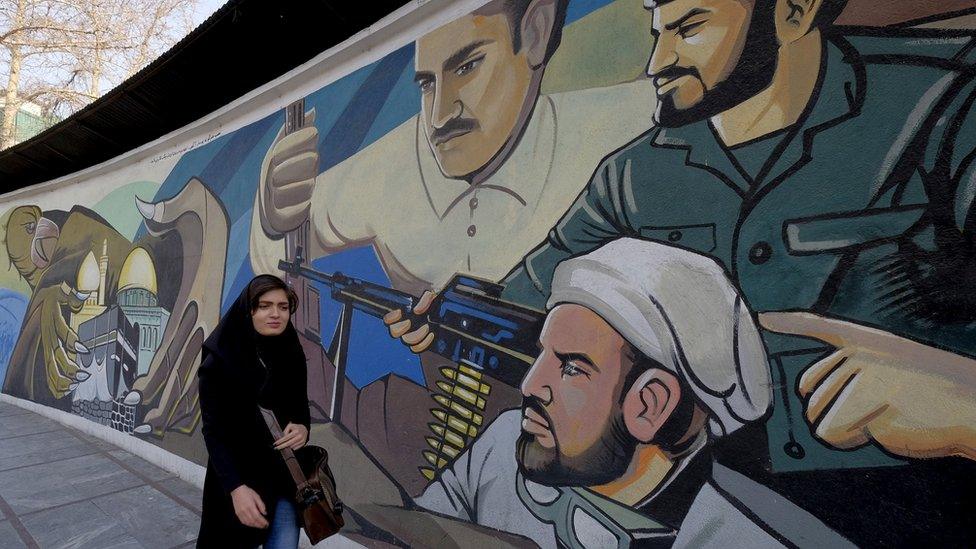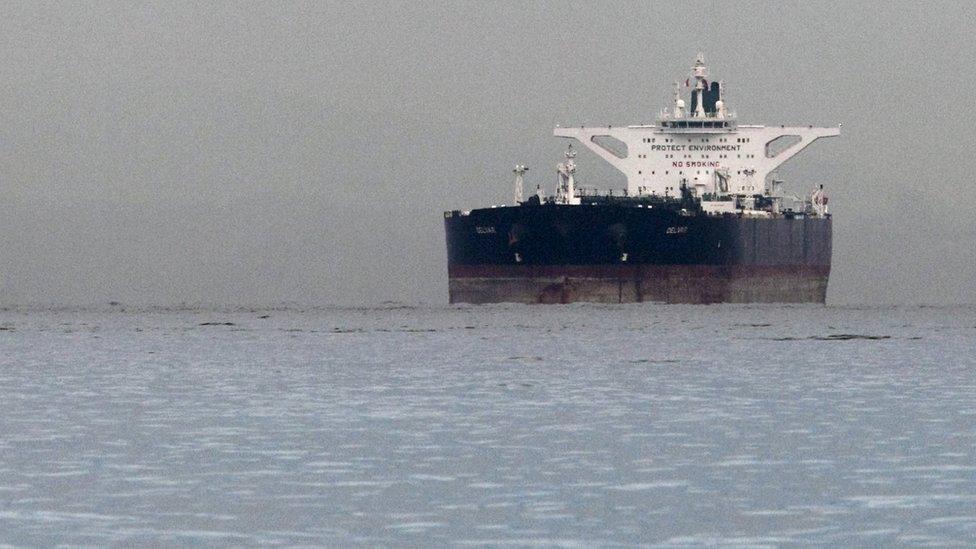Iran nuclear deal: Back in business for now
- Published

A money changer holds US dollar banknotes as he waits for customers in Tehran's business district on Sunday
The lifting of Iran's sanctions marks an important moment.
After 15 years, it is tempting to think that the West's stand-off with the Islamic Republic is finally over, and what an extraordinary transformation.
Only a few years ago Iran was seen by Western powers as a dangerous pariah state, led by a president, Mahmoud Ahmadinejad, who regularly indulged in inflammatory rhetoric against countries like Israel.
Iran's critics would describe its network of political and military support for Shia Muslim allies across the Middle East as a worrying "arc of Shia instability".
They believed Iran was intent on developing a nuclear capacity which would cement its status as a major power in the region.
Analysts were beginning to suggest that Iran might be only months away from having the material to produce nuclear weapons despite its denials.
What changed was new leadership.
In the United States a new American president - Barack Obama - reached out to Tehran early on in his presidency to try to reinvigorate diplomacy.
And in Iran President Ahmadinejad was replaced by a much more moderate government under President Hassan Rouhani, who made no secret of his desire to seek a deal to end sanctions and save Iran's crippled economy from total disaster.
Iran nuclear deal: Key details
Iran nuclear crisis: Six key points
Will Iran now get a McDonald's?
At the same time there was also a growing recognition that the balance of security risks in the region was changing. Another disturbing enemy was gaining in strength, causing havoc in parts of the Middle East and beyond: the jihadist movement known as Islamic State.
Common cause
Analysts noted that Iran too saw it as a danger. One retired European intelligence chief mused at a private dinner in 2010 or 2011 that it made no sense for Western powers to be at loggerheads with Iran, when it would surely be a useful and effective partner in countering al-Qaeda and its jihadist offshoots.

Suspicion of Iran's motives is now mixed with awareness of its potential
At the time, the remark seemed almost heretical. Before long, it was mainstream thinking in London's corridors of power.
Yet many remained sceptical about whether Tehran could be trusted. Even just two years ago, Iran was excluded from talks on the first attempt to convene an international Syria peace conference.
Roll forward to the end of 2015 and a new attempt to open a Syrian diplomatic track, and no-one was denying that Iran - like Russia - was a central player.
As Implementation Day approached, Western diplomats warned that lifting sanctions might not make much difference in the short term, as foreign companies could take time to regain confidence in trading with Iran, for fear of falling foul of US legislation on remaining restrictions.
But in fact all the signs are that businesses the world over are jostling to win a piece of the Iran market.
It seems that at this time of global economic downturn, the prospect of re-forging ties with Iran to help rebuild its infrastructure, refurbish its transport links and service 80 million Iranian consumers hungry for outside goods, is an extremely attractive prospect.
But if, from the Western perspective, this weekend's lifting of sanctions is a signal that Iran is on its way back in from the cold, that is not the end of this story.
Asian hopes
Western diplomats point out there are still plenty of issues where Iran's behaviour is questionable, from its human rights record, to its many executions, to its role in fuelling regional conflicts.

Iran's oil tankers will be back in demand
And in global terms, lifting sanctions and re-engaging with Iran may bring benefits for some, but it means problems and uncertainties for others.
Inside Iran, it is thought that endemic corruption and mismanagement of the economy are as much to blame for the country's economic woes as the punitive effect of sanctions. It is by no means clear whether President Rouhani can use the scrapping of sanctions to end high inflation and high unemployment. And though Iran can now sell its oil to the world again, the gain will be less than it hoped, given current low prices.
The risk for President Rouhani (and by extension those in the West who are hoping that he represents a long term pro-Western re-orientation in Tehran) is that if the economic boost is only modest, it could give rise to popular frustration and disappointment, which will inevitably be exploited by his hardline opponents.
For other oil producers, the prospect of new Iranian crude flooding back on to the market is also worrying. From Saudi Arabia to Venezuela, Brazil and Russia, countries are already feeling the pinch from reduced oil revenues.
Conversely, for net importers of hydrocarbons, more Iranian oil is good news. Already it is thought that Asian governments from China to Japan, South Korea and India, are lining up deals to move in swiftly.
China, the world's biggest importer of Middle Eastern oil, has particular reason to take an interest. President Xi Jinping is on the point of making a rare visit to the region, taking in Iran, Saudi Arabia and Egypt.
But it is also clear that the Chinese government is worried about heightened tensions in the Middle East from those who fear a newly empowered Iran will increasingly threaten their stability and security.
New dangers
Iran's old adversary, Israel, remains deeply worried about Tehran's intentions.
But probably most suspicious of all is Saudi Arabia, which recently broke off diplomatic relations after an Iranian mob attacked and set fire to its Tehran embassy in protest at the Saudi government's execution of a Shia cleric.
It is not yet clear how far this row will go.
Western diplomats engaged in trying to mediate between the two sides say they hope neither Tehran nor Riyadh will let their quarrel scupper the fledgling efforts to launch another Syrian peace process.
But there is little doubt that, though the Iran nuclear threat may be off the table for now, stability in the Middle East is still elusive, and the deepening rift between Shia Iran and its Sunni Gulf neighbours holds many new dangers.